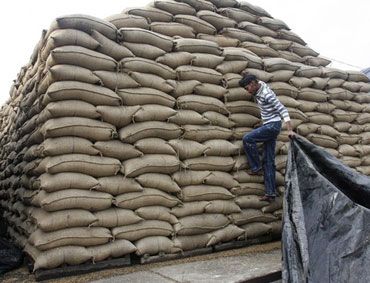 With grain procurement target significantly higher, FCI is faced with storage space shortage.
With grain procurement target significantly higher, FCI is faced with storage space shortage.
Storage issues might resurface at Food Corporation of India after two years of low grain procurement as the target for rabi wheat purchase this year has been increased sharply.
The food ministry in a statement on February 15 set a 33 million-tonne wheat procurement target for the season beginning April, a jump from the previous year’s procurement of 22.96 million tonnes.
While the target is for the entire year, much of the procurement happens between April and June.
Government agencies, including FCI and state government warehousing companies, have procured 43.71 million tonnes of paddy by February 15.
Also, FCI in association with the Small Farmers’ Agribusiness Consortium and National Agricultural Cooperative Marketing Federation of India (Nafed) has for the first time procured 1 million tonnes of pulses till February 15.
“The government has directed us to procure pulses at the minimum support price in various locations. It has also increased our wheat procurement target by 10 million tonnes. We will need additional storage space this year. FCI may hire private warehouses,” said an FCI executive.
Last year, a large number of warehouses remained empty due to low procurement.
“But hiring private godowns will depend upon purchases by multinational grain companies. If prices remain higher than the MSP, multinational companies might procure more grain. But FCI is planning to procure 25.5-28.5 million tonnes of wheat this year, which will start by March,” said another FCI executive.
FCI has increased its storage facilities by a third in six years to 81.48 million tonnes. Central Warehousing Corporation, State Warehousing Corporation and private investors have additionally built 13.34 million tonnes of storage under the private entrepreneurs guarantee, of which FCI has taken over 12.74 million tonnes.
Private investors under the aegis of FCI have also built 0.5 million tonnes of silos.
“There will be no storage problems in traditional markets. There could be some requirements in non-traditional markets,” said Sanjay Kaul, managing director, National Collateral Management Services.
The agriculture ministry forecasts the country’s rice output this year at 108.86 million tonnes, up from 104.41 million tonnes a year ago, and wheat output at 96.64 million tonnes, up from 92.29 million tonnes.
Photograph: Reuters.












 © 2025
© 2025